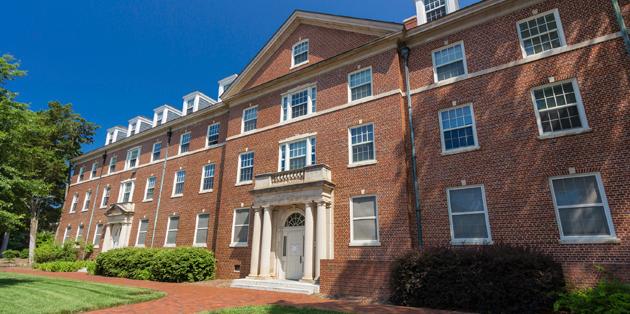
Life in college residence halls has been the fodder for many coming of age stories. But today’s university housing has big differences from the residence halls popularized in movies and novels. At the forefront of those changes and differences are housing professionals. This month Andrew Hibel talks with Mary DeNiro, CEO and executive director of the Association of College and University Housing Officers International (ACUHO-I), about those changes and how professionals can and should stay up to date and respond.
Andrew Hibel, HigherEdJobs: You assumed the role of executive director of ACUHO-I in March 2015. What are some of your highlights that you’ve experienced so far in your position?
Mary DeNiro, ACUHO-I: There have been so many highlights it’s hard to select just a few. From a personal perspective, the highlights have been getting out and meeting ACUHO-I members where they are; whether that is on their campuses, at regional conferences, or events like The Placement Exchange. There is so much for me to absorb and learn about our members and the work that they do. I may not understand all the ins and outs of campus housing yet, but I can assure you that I do know our members are incredibly knowledgeable and dedicated to their responsibilities.
Student housing professionals are actively engaged in understanding the trends in higher education and what that means about the future of residential college experience. From the association’s perspective, in the last 10 months we have made great strides in bringing parts of our strategic plan to life as we make progress on different projects. So that is certainly a highlight.
Hibel: What types of challenges have you discovered in the field of university housing? How have these changed over the past decade?
DeNiro: New issues always arise in campus housing. What is different now, though, is the level of intensity in which these trends are happening. The spotlight on affordability, student mental health, and social justice certainly is brighter than it has been in recent memory.
One of the most visible trends is the continued effort to update housing facilities constructed in the late 1960s and early 1970s through renovation and/or replacing with new halls. These efforts are done so that campuses can meet changing occupancy trends as well as to deliver the amenities and services this generation of students expects.
There are several additional trends that occur more behind-the-scenes, but are equally important. For example, our members must stay up-to-date on pending legislation that impacts how they do their jobs. They must continually identify the ever-changing need of students and be prepared to address and connect students with campus support services such as academic and career advising, mental health concerns, safety and security, and the like.
Hibel: How has the changing economy over the past several years affected the way universities view the building or planning of university housing?
DeNiro: The changing economy asks leaders to think more about the decisions that they make and have empirical evidence, when possible, to back up those choices. For example, we know that budgets can be tight, and the question of how to keep education affordable for students is in the forefront of everyone’s mind. So, when the question arises about whether or not to build a new residence hall, or what features the hall will have, they want to make sure they are spending money where it will have the greatest benefit to the student. That may mean including more community space and study lounges versus having additional beds in the residence hall. There are hundreds of choices to be made and there is knowledge and experience and rationale behind every single one of them.
Hibel: One of the many issues ACUHO-I has to contend with is sexual assault on campus, which unfortunately seems to make news too often. How has ACUHO-I educated colleges and universities on how to prevent and respond to these issues on campus? What else do you think administrators need to do on campus to prevent these situations?
DeNiro: The safety and security of students is first and foremost in the minds of all campus housing professionals. There is no question about that. We work closely with our colleagues across campus to design and implement meaningful programs to achieve a community that respects and embraces the dignity of all students. We also work on improving building design to incorporate safety features. Our members are leaders on campus in discussing and implementing the student education piece of this because teaching students to look out for themselves and others, and not to do things like letting a stranger into the building, or propping a door open, is vitally important.
In addition, our members individually, and also on behalf of the association, work to stay abreast of any changes in legislation, reporting guidelines, and other issues related to safety and security. When decisions are made in court or new laws are passed – or even under consideration – we share that information via social media, our publications, and conference presentations. For example, almost every article we post about proposed concealed-carry laws on campus will generate an active conversation among our members.
Hibel: In an article from ACUHO-I’s magazine, Talking Stick, it mentions that campus drug and alcohol policies are not one-size fits all. However, what are some general themes that you think policies should include?
DeNiro: That article reviewed how drug and alcohol violations at different campuses may be addressed based on the culture and other factors unique to that university. There are similarities, and in cases like setting alcohol policies, there are the local and federal laws that govern the entire campus. But in many cases, different schools can take a very different approach to the same issue.
That is one of the greatest strengths of ACUHO-I. We have more than 1,000 colleges and universities members. When a campus is looking for suggestions and guidance on something like implementing gender-inclusive housing, or starting a new sustainability program, or building a new hall, there is literally a whole world’s worth of examples out there of other campuses that may have faced similar decisions. Our members have the chance to discover what did and didn’t work for their colleagues and learn from their experiences.
Hibel: Several campuses have been dealing with complications related to ADA and service/comfort animals. How have the requests for comfort animals changed over the years and do you think this is an issue that needs to concern campus housing officials?
DeNiro: The courts have spoken on a number of cases related to service and comfort animals. As more of these cases were being brought forward on different campuses, it raised a lot of questions about what campuses could do and what they were required to do. It was the uncertainty of it all that caused the confusion. Now that more specific guidelines are being set our members will do what they always have done; go out and find the best ways to address these changes and integrate it into their day-to-day operations such as managing room assignments, facilities concerns, roommate matching, and others as they arise.
Hibel: The Placement Exchange, which is co-sponsored by ACUHO-I, six other student affairs organizations, and HigherEdJobs, is taking place on March 9-13. Over the past several years we’ve asked guests involved with associations from TPE for their advice for candidates interviewing at this event. In previous interviews with Dr. Waller from ASCA and Dr. Hernandez from NODA their responses included the advice of planning accordingly for interviews at the event and most importantly preparing in advance of the interviews. Do you have other suggestions for candidates before or during the TPE interviewing event?
DeNiro: The job search process is such an exciting time, filled with so many different emotions and things to consider. I should know, I was going through it just more than a year ago! Add to that the fact that so many people at The Placement Exchange are looking for their first professional position, it really brings an exciting energy to it all.
My advice to those job searchers is to harness that energy and use it to your advantage. These are intelligent people who have been well-prepared by their graduate programs. But, you know what, so have hundreds of other people. So I would tell them that, when they approach that interview table, don’t hold anything back. Be enthusiastic in your answers. Share any real-world experiences that you have had and try to demonstrate how your work made a program stronger or resulted in some other positive outcome. Be honest in your answers as well. Campuses are looking to hire people that will be a good fit within their particular campus culture and you should want to find the school that is the best fit for you as well. That may mean working at a smaller, private school instead of a larger state school, for example. There’s not a right or wrong choice; it’s just what is right or wrong for you.
Hibel: What advice do you have for a higher education professional looking to start or transition into a position in university housing? What would be some key components on their resume and in interviews that you would want to know about in order to make them a solid candidate?
DeNiro: Campus housing professionals – particularly at the entry level – are called upon to fill so many roles it is important that they can demonstrate a variety of experiences. Along with their background student learning, program development, community building, and the like, on any given day a housing professional may be thinking about conference services, student leadership, crisis management, conduct issues, facility maintenance, supervision, conflict resolution, and so many other topics. Further down the road in their career they may begin to specialize more, but for now they need to be well-rounded for certain.
Hibel: What upcoming events or tasks are you most excited about?
DeNiro: ACUHO-I’s largest event, the Annual Conference & Exposition, is this July 9-12 in Seattle. The event brings together campus housing professionals from around the world for four days of speakers, educational sessions, and invaluable networking opportunities. Seattle is also just a great city!
